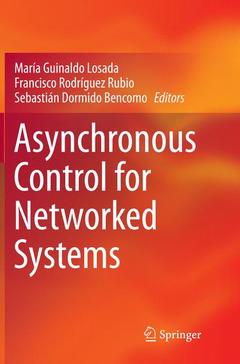Description
Asynchronous Control for Networked Systems, Softcover reprint of the original 1st ed. 2015
Language: English
Subject for Asynchronous Control for Networked Systems:
Publication date: 10-2016
Support: Print on demand
Publication date: 09-2015
Support: Print on demand
Description
/li>Contents
/li>Biography
/li>Comment
/li>
This book sheds light on networked control systems; it describes different techniques for asynchronous control, moving away from the periodic actions of classical control, replacing them with state-based decisions and reducing the frequency with which communication between subsystems is required. The text focuses specially on event-based control.
Split into two parts, Asynchronous Control for Networked Systems begins by addressing the problems of single-loop networked control systems, laying out various solutions which include two alternative model-based control schemes (anticipatory and predictive) and the use of H2/H? robust control to deal with network delays and packet losses. Results on self-triggering and send-on-delta sampling are presented to reduce the need for feedback in the loop. In Part II, the authors present solutions for distributed estimation and control. They deal first with reliable networks and then extend their results to scenarios in which delays and packet losses may occur.
The novel results presented in Asynchronous Control for Networked Systems are transmitted in a concise and clear style supported by simulation and experimental examples. Some applications are also provided.
Academic researchers and graduate students investigating control theory, control engineering and computer communications systems can use this monograph to learn how asynchronous control helps tackle the problems of networked systems in centralized and distributed schemes. Control practitioners at work in power systems, vehicle coordination and traffic networks will also find this book helpful in
improving the performance of their systems.Francisco R. Rubio received the Industrial Electrical Engineering degree and Doctorate from the “Escuela Técnica Superior de Ingenieros Industriales de Sevilla” in 1981 and 1985, respectively. He received the CITEMA award for the best work on automation by a young engineer in 1980. He is Professor in the Department of Systems Engineering and Automatic Control of the University of Seville.
He has been Head of Laboratory, Deputy Director of the School of Engineering and Head of the Department of Systems Engineering and Automation at the University of Seville. Member of the faculty at the University of Seville from 2000 to 2002 and has served in recent years on various committees at Department and Engineering School levels. He is also the head of the research group “Automation Engineering, Control and Robotics” (TEP-0201).
It has also been peer assessor of research projects and scientific journals and proceedings, and has served as evaluator of the Institutional Program of Quality and the University Professor Accreditation System for the National Agency for Assessment and Accreditation (ANECA, Agencia Nacional para la Evalua
Low-order worked examples simplify the theoretical results for easier understanding
Rigorous analysis and proofs provide reliable results
Discusses open problems and offers the reader potential paths to their solution
Includes supplementary material: sn.pub/extras




